- Giới thiệu
- Nhóm Công tác
- Tin tức
- Thông tin về FTA
- Tài Liệu
- Sự kiện
- Liên hệ
Transforming the food system: The 'key' to sustainable agricultural development
On December 13th, the 2024 Partnership for Sustainable Agriculture in Vietnam (PSAV) Annual Conference, titled 'Public-private partnership to promote the development of the food, agriculture and food innovation ecosystem', took place in Hanoi.
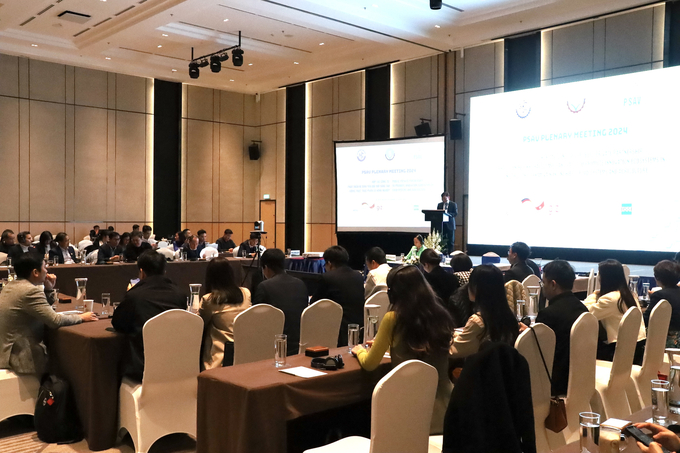
The 2024 PSAV Annual Conference highlights the importance of public-private cooperation in the effort to build a modern, sustainable and highly adaptable agricultural sector in Vietnam. Photo: Phuong Linh.
Currently, agriculture plays a crucial role in the socio-economic development of the country, contributing nearly 15% to the national GDP. However, to adapt to climate change, environmental pollution, and global competitive pressures, the agricultural sector must not only change its traditional production mindset but also strive to build a modern agricultural ecosystem that integrates technology and digital transformation at every stage.
Mr. Nguyen Do Anh Tuan, Director of the Department of International Cooperation at the Ministry of Agriculture and Rural Development, emphasized the crucial role of the Partnership for Sustainable Agriculture in Vietnam (PSAV) in driving innovation within the agriculture, food and nutrition sectors.
"Besides being an effective bridge between the government, businesses and international organizations, PSAV supports the restructuring of the agricultural sector towards ecological and sustainable development. It contributes actively to promoting digital transformation, green transformation and emission reductions, in line with Vietnam’s commitment at COP26 to achieve net-zero emissions by 2050.
At the same time, it serves as a platform for formulating appropriate policies, boosting international integration and expanding markets for Vietnamese agricultural products, thus helping to elevate Vietnam’s position in the global value chain", Mr. Tuan said.
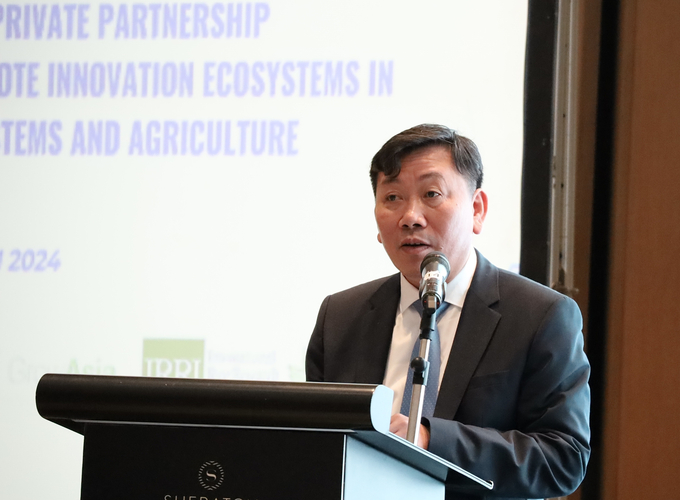
Mr. Nguyen Do Anh Tuan, Director General of the International Cooperation Department (Ministry of Agriculture and Rural Development), delivered a speech at the conference. Photo: Phuong Linh.
Ms. Amy Mlissa Chua, Director of Partnerships at Grow Asia, shared that the outcomes of COP29 in Baku highlighted the fact that the international community has not yet reached a consensus on how to effectively address the critical challenges in transforming the global food system.
Although an agreement has been reached to mobilize 300 billion USD annually by 2035 to support developing countries in combating climate change, this figure remains insufficient compared to the 1.3 trillion USD that these countries require to effectively address the challenges. Agriculture, a sector that is both significantly impacted by climate change and a major contributor to the issue, has not received the level of attention it deserves in climate finance discussions.
Small-scale farmers, who play a crucial role in the food system, remain excluded from official climate negotiations. This group of farmers currently produces over 80% of the food in the region and is the most vulnerable to the impacts of climate change.
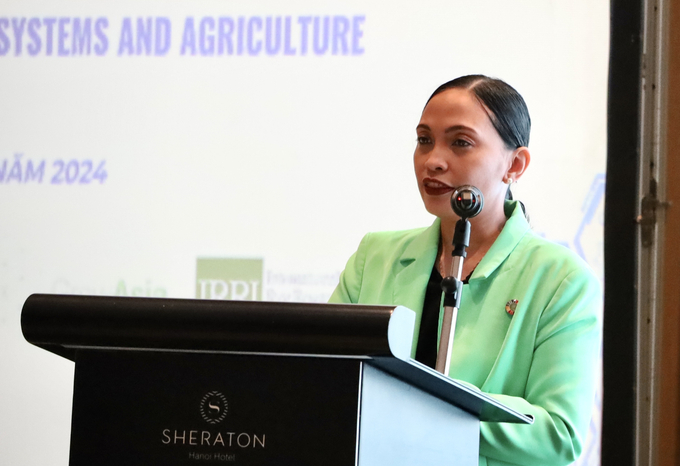
Ms. Amy Mlissa Chua, Director of Partnerships at Grow Asia, affirmed her ongoing support in the development of Vietnam's agricultural sector. Photo: Phuong Linh.
Currently, Grow Asia is at the forefront of the GrowBeyond initiative, with the goal of mobilizing 1 billion USD in climate finance for small and medium-sized agricultural enterprises in Southeast Asia by 2030. This initiative employs a blended finance model, which combines both public and private sector resources to help small-scale farmers gain access to markets and affordable financial services. Additionally, the initiative seeks to expand regenerative farming practices.
"We are committed to continuing our collaboration with PSAV, the Ministry of Agriculture and Rural Development (MARD) and the Ministry of Natural Resources and Environment (MONRE) to mobilize investments and drive the development of Vietnam's agricultural sector. Together, we can build a food system that is not only sustainable and resilient but also equitable- a system that supports both people and the planet for future generations", said Ms. Amy Mlissa Chua.
International experiences in innovating Vietnam's Food System
To clarify the Food Innovation Project in Vietnam, in September 2024, the Ministry of Agriculture and Rural Development issued a decision to establish the Partner Group under the Vietnam Food Innovation Network (FIH). The FIH adopts a comprehensive value chain approach, focusing on identifying challenges and solutions across all stages of the value chain. This includes inputs, production, post-harvest handling, transportation, processing and ultimately reaching the final market.
Ms. Rachael Cox, a Fulbright expert, stated that through the stages of identifying adjustments, additional innovation needs, and new priorities, the industry task force will continuously drive the innovation process to address urgent and emerging challenges within Vietnam's agricultural value chain.
"FIH has designed a comprehensive capacity development plan that concentrates on key innovation areas, which have been identified based on the results from earlier research phases. In addition to this, FIH is establishing a food and agriculture innovation incubator that will provide vital business support for innovations in these priority fields. This incubator will assist startups, entrepreneurs and innovators by offering them the necessary resources, mentorship and financial backing to help them thrive and achieve long-term sustainability in their ventures.
Furthermore, it will enhance the organization of workshops, training sessions, and digital resources to build knowledge and innovation capabilities, while also providing investment opportunities and access to funding", said Ms. Rachael Cox.
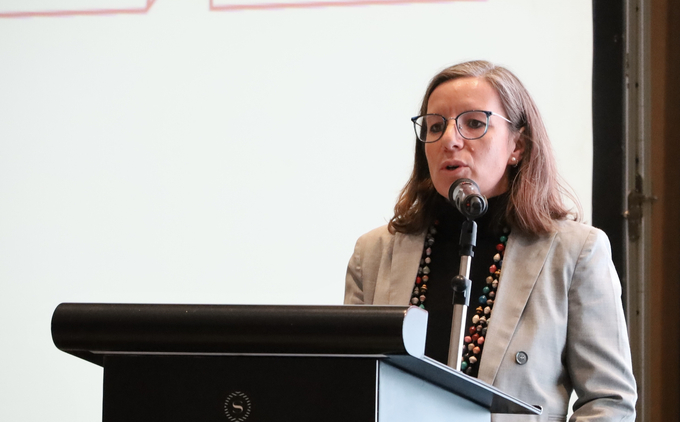
Ms. Sonja Esche, Head of Agriculture at the German International Cooperation Agency (GIZ) GmbH, shared GIZ's activities at the conference. Photo: Phuong Linh.
Ms. Sonja Esche, Head of Agriculture at the German International Cooperation (GIZ) GmbH, shared insights on the collaborative efforts with research institutes under the framework of the GIC project. One of the key initiatives is the establishment of the Sustainable Rice Platform (SRP) Forum, which aims to promote more efficient and sustainable rice farming practices.
The forum primarily focuses on testing and implementing a range of innovative agricultural techniques. These include the "1 Must 5 Reductions" method; Alternate Wetting and Drying (AWD); Integrated Pest Management (IPM) and innovative straw management techniques.
"GIZ focuses on developing the private sector, supporting private enterprises, especially small and medium-sized enterprises (SMEs), to improve their competitiveness and expand business opportunities. The private sector is the main beneficiary of GIZ's initiatives, helping to create jobs, increase income, and strengthen the local economy.
In addition, we collaborate with the private sector as project partners in various fields. Private partners can contribute in kind or financially towards the goal of enhancing the sustainability and broader impacts of the project", stated Ms. Sonja Esche.
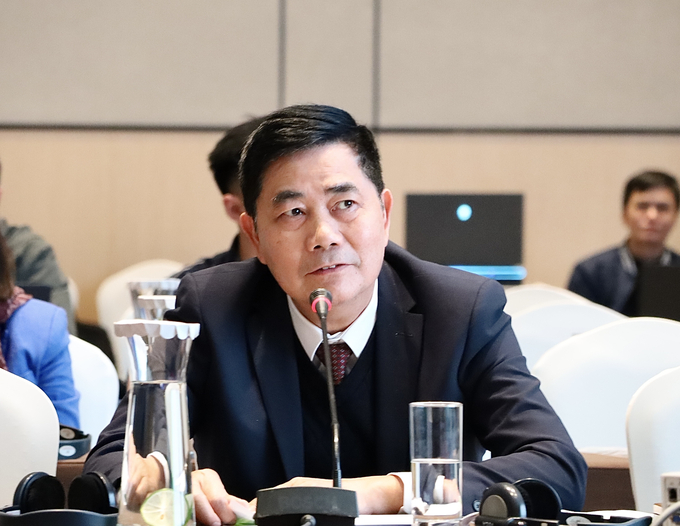
Dr. Cao Duc Phat, Chairman of the Board of the International Rice Research Institute (IRRI), shared insights on innovations for the transition to sustainable agriculture. Photo: Phuong Linh.
Dr. Cao Duc Phat, Chairman of the Board of Trustees of the International Rice Research Institute (IRRI), emphasized that the transition to sustainable agriculture should focus on increasing the value of agricultural products by enhancing quality and applying new technologies. This approach should also prioritize the more efficient use of resources and inputs, as well as reducing production costs. These efforts aim to help farmers maintain high profits while ensuring the protection and preservation of natural resources.
Sustainable agriculture not only focuses on reducing greenhouse gas emissions and minimizing pollution, but also plays a crucial role in increasing the income of farmers and enhancing the overall living conditions of rural communities. In addition to these environmental and economic benefits, sustainable agricultural practices also aim to provide more inclusive opportunities, ensuring that women and young people have equal access to participate in the agricultural sector.
Tin liên quan
Agriculture and Environment exhibition ready for National celebration2025/08/27
Vietnam to transfer 1 million tons of carbon credit the World Bank2025/08/29
China surpass the U.S. to become Vietnam's largest market for cashew nuts2025/08/25
Enhancing adaptive climate change monitoring in agriculture and the environment2025/08/21
ICD to affirm Vietnam's voice in global agriculture and environment forums2025/08/01



 Điều lệ hoạt động
Điều lệ hoạt động



















































